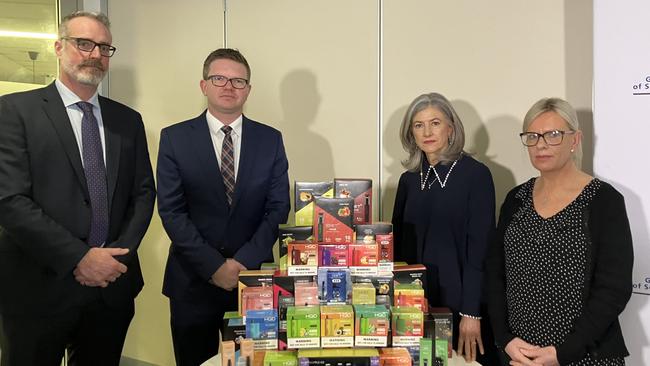SA Health vape crackdown targets 200+ Adelaide shops
A crackdown on vaping retailers looms as packaging claiming products do not contain nicotine is dismissed as “a lie”.
SA News
Don't miss out on the headlines from SA News. Followed categories will be added to My News.
Vape retailers face tough new regulations amid what Health Minister Chris Picton calls “a health emergency” and chief public health officer Professor Nicola Spurrier calls a “critical public health problem.”
After years of success fighting tobacco addiction, they say a new generation of teenagers will head to cigarettes after becoming addicted to nicotine via vapes.
“A lot of these products say they are nicotine-free but they are not — it is just a lie,” Mr Picton said. “The vast majority contain nicotine.”
Under regulations to come into force from July 10 the onus will be on retailers including convenience stores, service stations and barber shops to prove their vapes do not contain nicotine regardless of the packaging claims.
Laws introduced in October 2021 classify nicotine vaping products as prescription-only medicines and prevent the sale of nicotine-containing e-cigarettes without a prescription.
Retailers face fines of up to $20,000, seizure of stock and revocation of licences if selling vapes containing addictive nicotine.

The July 10 start will also see a two-month blitz by SA Health officers on retailers to ensure they are not selling nicotine-laden vapes, and “at least 200 will need special attention” says SA Health’s Licensing Services director Chris Lease.
Enforcement blitzes over the past year have resulted in the seizure of about 15,000 illegal nicotine vapes, including from unlicensed premises, as well as 17 fines issued and three licences cancelled.
Retailers will need to provide information about their e-cigarette suppliers, importers or manufacturers, to enable products to be traced.
Mr Picton said “kids across SA are becoming addicted” causing havoc in schools as they concentrate on their next hit instead of schoolwork.
“We need to take much stronger action,” he said. “It is really a public health emergency we need to get on top of before it gets out of control.”
Mother of three Sara Driver, a health worker and constituent of Mr Picton’s electorate of Kaurna, was “blindsided and ashamed” to discover her two teenage daughters were addicted, one who started vaping at 13.
She said both needed nicotine replacement therapy after she discovered the cause of their lethargy, irritability and lack of focus was nicotine-laden vapes — which they even kept under their pillows to take at night.
“It took a while for the penny to drop, I found the packaging and it said there was no nicotine so I could not understand why they would not stop,” she said.
“I was horrified to discover how easy it was for them to purchase it. It is a potent, addictive drug.”
Ms Driver said it took months of both “cold turkey” and nicotine replacement therapy but she is relieved her daughters, now 15 and 19, are off vapes.
“They are two completely different girls,” she said.
Prof Spurrier warned nicotine “is a poisonous substance and incredibly addictive.”
“It is a critical public health problem,” she said of vapes, noting they were also single use plastic with lithium batteries.
“It is outrageous this has happened in Australia right in front of parents — we have difficult years ahead as so many young people addicted may turn to tobacco.”




